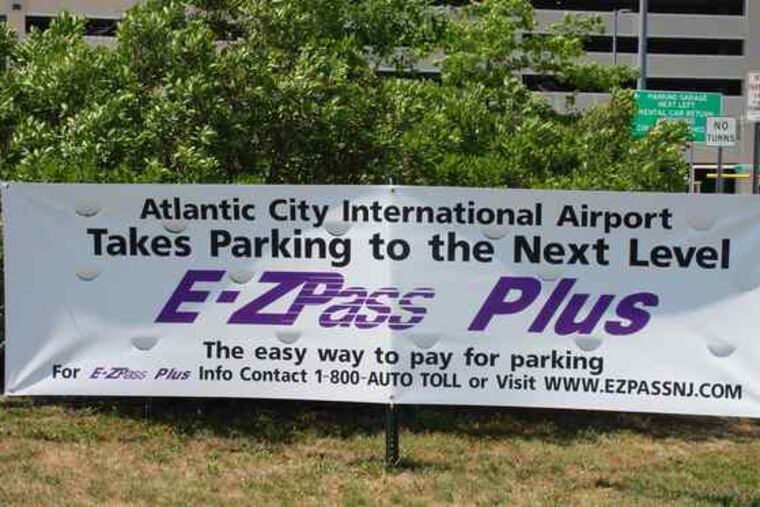Some airport parking welcomes E-ZPass
E-ZPass, the world's largest electronic toll system, is now at airports near you - including parking lots at Atlantic City International Airport.

E-ZPass, the world's largest electronic toll system, is now at airports near you - including parking lots at Atlantic City International Airport.
You can also use E-ZPass to pay for parking at five other airports: Newark, N.J.; and John F. Kennedy, LaGuardia, Albany, and Syracuse, all in New York.
But not Philadelphia International Airport. Yet.
The Philadelphia Parking Authority, which operates parking at the Philadelphia airport, is scheduled to meet tomorrow with the Pennsylvania Turnpike Commission to discuss putting E-ZPass in some parking-toll lanes at the airport here.
"We actually are looking at it," said authority spokeswoman Linda Miller.
Rina Cutler, deputy mayor for transportation, said she had spoken with the Delaware River Port Authority about "how we might pull this off."
"The Parking Authority is willing and would love to," Cutler said last week. "Yes, we do want it."
Using E-ZPass to pay highway and bridge tolls is an option in 14 states from Maine to Virginia and west through Illinois. About 25 toll agencies, such as turnpike commissions and port authorities, have a combined 11 million E-ZPass account holders with 19 million transponder boxes in vehicles.
The Atlantic City airport, which serves about 1.2 million passengers a year, began offering E-ZPass - dubbed E-ZPass Plus - in June 2008.
"We did it for the convenience of our customers," said Joel Falk, director of information and toll technology at the South Jersey Transportation Authority. The authority operates the Atlantic City Expressway, which was the first toll road in New Jersey that, in November 1998, tested and used E-ZPass technology.
"It was a logical progression to offer it in our airport," Falk said. The authority also offers E-ZPass Plus at a parking garage and a surface lot in Atlantic City.
"I fly out of this airport all the time, and E-ZPass is very convenient," said Brian O'Donnell from Ocean City, N.J., who was headed last week from the Atlantic City airport to Orlando with his niece Megan O'Donnell of Philadelphia.
"Philadelphia International should definitely get it," said Megan, 23. "They need it."
Frank and Betty Stepniak of Cape May said E-ZPass at the airport saved time. The couple flew from Atlantic City to Dallas, with a connection in Atlanta. "It's quick, and you don't have to worry about having cash when you leave the airport," said Frank Stepniak. "Definitely, it's a good thing."
Here is how E-ZPass Plus works at the Atlantic City airport:
Motorists take a ticket when entering the parking garage or lot. When exiting - if the E-ZPass tag is affixed to the windshield - an overhead antenna at the cashier booth scans the tag, just as for road and bridge tolls.
The driver inserts the parking ticket into a reader at the tollbooth and pushes a purple button to select E-ZPass Plus, takes a receipt, and the gate opens. If E-ZPass customers prefer to pay with cash or a credit card at the exit lane, they still can.
"Albany was the first airport with E-ZPass Plus in 2001. The most recent was Syracuse," said James Crawford, executive director of the E-ZPass Inter Agency Group in Atlantic City. "We are expecting Washington Dulles and Reagan National airports will be next."
At public airports, the agency collecting the toll receives 12.5 cents per parking transaction. The toll agency also receives a 2.5 percent credit-card-processing fee per transaction to cover costs.
"There are additional items that have to be covered, and how those are covered is based on the agreement between the host, like the Pennsylvania Turnpike, and the airport - who pays for the communication line to send the information back and forth, who pays for the equipment, installs and maintains the equipment," Crawford said.
Until recently, people who signed up for E-ZPass with the Pennsylvania Turnpike Commission could not use it to pay for parking at the five New York and New Jersey airports. But after getting software to process parking fees, the commission notified customers last month that as of Nov. 1, they were automatically enrolled in E-ZPass Plus.
"Now that we have the capability, the Philadelphia Parking Authority contacted us and wants to discuss it," Pennsylvania Turnpike Commission spokesman William Capone said.
Parking fees less than $20 are deducted from the customer's prepaid E-ZPass account. Parking fees of $20 or more are charged directly to the credit card used to replenish the E-ZPass account. In either case, the transaction is reflected on the monthly E-ZPass statement.
The advantage to airports is that E-ZPass allows them to clear parking faster during peak periods, Crawford said. His group manages the regulations under which the 14 E-ZPass states and 25 toll agencies operate.
"Eventually, airports can reduce staffing," Crawford said. "Most airports have been unwilling at the beginning to not put anybody in those booths for fear that somebody pulls up and does not have E-ZPass Plus, and the gate does not open. Eventually, airports can have one person for three or four E-ZPass booths."
Anything airports do not like?
"They don't like paying anybody extra," he said. "They also don't like waiting for their money. We only guarantee that they will get payment once a month. Frequently, they are able to get weekly settlements, or every two weeks, depending on the agreement they reach with the toll agency. These are all wire transfers."